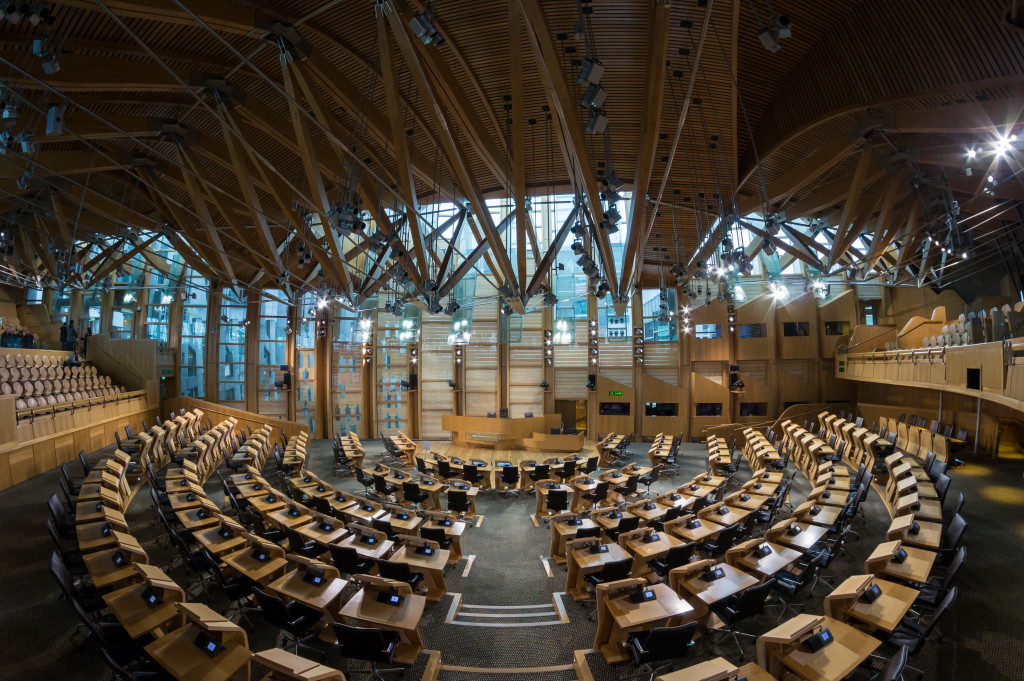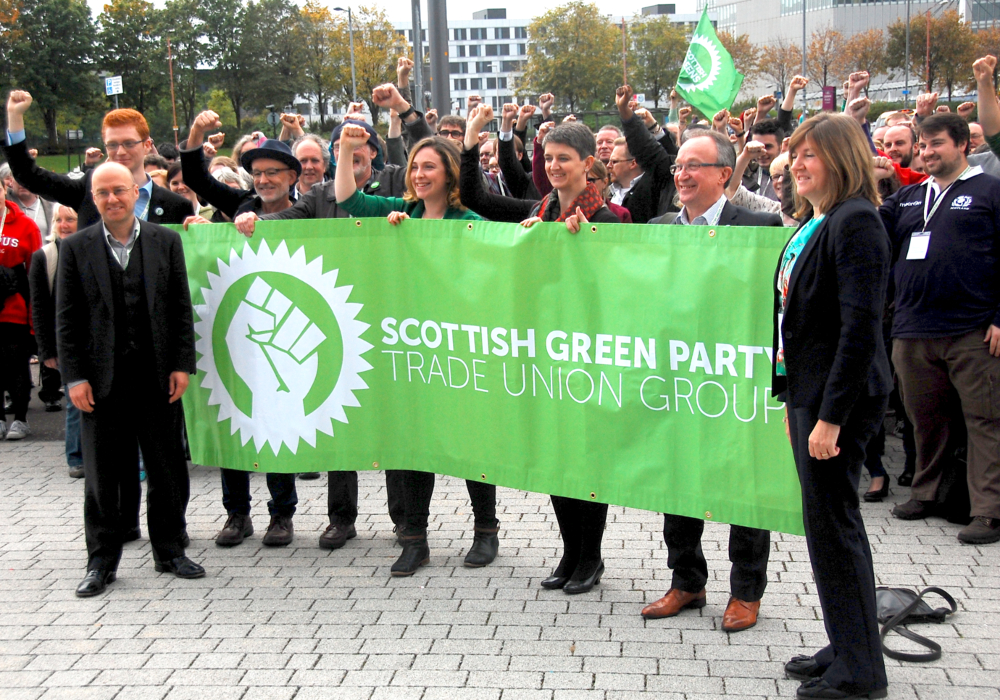Scotland’s voting system stooshie is about politics, not maths

Much of the brawl about D’Hondt isn’t really about D’Hondt. What it’s really about, it seems to me, is the relative importance of an SNP majority vs the maximum number of pro-independence MSPs.
For the uninitiated (and if you’re familiar with all of this, skip this bit) I’ll try to summarise: Scotland’s voting system gives each of us two ballots: one for a constituency MSP, one for a regional party list. Once constituency MSPs have been elected First Past the Post, the list votes are used to try to balance out the parliament, making the total number of seats each party has in each region roughly proportional to the vote it gets on the list ballot. To do this, the number of votes a party gets on the list is divided by the number of MSPs it already has in the region (including constituency MSPs), plus one.
The quirks of this system have led some to argue that supporters of independence ought to use their list vote to back a “Yes” party other than the SNP. After all, each SNP vote will be divided by the number of seats the party already has in the region – which is likely to include all or almost all of the constituencies. A vote for a party which isn’t going to win constituencies has more power.
Others point out that such a tactical vote could cost the SNP MSPs – after-all, they managed to win every constituency in the North East in 2011, and still get a seat on the list. Particularly in the case of RISE and Solidarity, they point out that tactically voting for a party which is yet to register any support in the polls is a fool’s errand. A huge SNP vote may still be bigger than the RISE vote even after it’s been divided by ten. It doesn’t make sense to vote tactically for a party which has almost no chance of winning. It’s a circular argument, but to make the case for tactical votes, RISE do first have to show that they have a chance of getting in.
For me, though, this whole stooshie obscures a very different question. As often seems to happen in politics all across Britain, an argument about maths is hiding a debate about politics. Because, ultimately, both sides are failing to admit to some basic things.
First, it really is true that a relatively small proportion of people who support independence voting Green rather than SNP on the list could notably increase the overall number of yes supporting MSPs (and so decease the number of unionist MSPs). Even the worst polls for the Greens shows the party in the proximity of getting an MSP in each region, so a Green vote can hardly be dismissed as wasted. It’s also true that, in the process, a few people who would become SNP MSPs had those voters backed Sturgeon’s party, might well miss out.
To get a sense of the sort of difference this can make, it’s worth spending some time popping recent polls into one of the Holyrood seat calculators, and then shifting votes between the SNP and Green boxes on the list. The differences aren’t huge, but they are meaningful. For example, the most recent poll, as I write this, gives the SNP 70 seats and the Greens 8. If two percent of people shift from the SNP to the Greens on the list, then the SNP keep 70 MSPs, but the Greens go up to 12. If five percent switch (which is probably fanciful), then the SNP drop 1 MSP to 69 seats, the Greens rise to 16.
If the SNP have a particularly bad day (compared to the polling and their recent electoral performances) such a vote might even narrowly cost them their majority. On the other hand, if such a switch was on a big enough scale to make that kind of difference, it would also very likely increase the total number of independence supporting MSPs, and reduce the number of unionists.
The question, then, is, which of those things is more important for those for whom independence is a primary concern? In both scenarios, Nicola Sturgeon would stay as First Minister. In both scenarios, Holyrood would have a majority of MSPs who support independence.
I have been asking for a while: why is it so vital that the SNP get a majority, rather than simply an overwhelming plurality, with Sturgeon reliant on support from parties to her left? I’ve yet to hear a good answer.
Looking at the long term question of independence on its own, it seems to me that a parliament made up of a number of different parties, arguing passionately on other subjects, but agreeing on independence, is more likely to convince the majority of Scots to vote Yes next time than a more monochrome chamber seen to speak largely with the same voice.
It’s not by supporting the SNP until independence that we’ll convince our fellow Scots of the case for it. It’s by building in Scotland an appealing, lively and hopeful debate about the future which excites people much more than the moribund drone of Westminster. After-all, neoliberalism didn’t conquer the UK by capturing the Tories. It won when the debate became one between a number of different parties, all of whom agreed on the basics of privatisation, deregulation and trickle-down economics.
More generally, on issues from land reform to local taxation, energy policy to economic strategy, Holyrood is more likely to thrive if the SNP is kept on its toes; if other parties are able to push forward more radical ideas and to keep debate alive.
And, long term, that’s probably what’s best for the SNP too. Its own growing domination is perhaps the biggest long-term threat that the party faces. It’s not because of any intrinsic laziness or corruption or idiocy that Scottish Labour became what it did. It’s because strength bred complacency, attracted the sorts of people attracted to power, and stopped the flow of new ideas.
Those who argue that voting ‘tactically’ for parties other than the SNP is too risky are afraid that, on the most pessimistic reading of polls, the SNP might just lose their majority. If you think an SNP majority is vital to Scotland’s future – that the party leading a minority government sometimes dependent on Greens and perhaps others would be a disaster – then it certainly does make sense to vote SNP with both votes. If you are a loyal SNP supporter, you’re presumably going to vote SNP as a matter of principle, and who can argue with that?
But if you’re the kind of person who wants Scottish politics to be bolder than that, then don’t let anyone tell you that voting for someone other than the SNP is too much of a risk. The biggest danger in Scottish politics right now is that we let the SNP slide gradually into the comfortable bum-print Labour left for them in the seat of power. In May, we have a great opportunity to vote for a vibrant parliament representing the best of the Yes campaign. Let’s not miss it.



Many thanks for your article — I’m yet to be convinced of the actual maths of voting for the SGP on the list. I know that at least one seat calculator says that people switching from SNP to the SGP leads to a net gain in pro-independence MSPs, but when I’ve tried to put a spreadsheet together that reflects my understanding of D’Hondt I get a different result; one that lets in Unionist MSPs.
I’m not absolutely sure that my calculations are accurate and I’m not a statistician; but I’m mindful that the seat calculators don’t reveal how they calculate the number of seats that a specific set of votes will lead to. Are you aware of any articles that do these calculations and show their working?
You seem to be encouraging some SNP voters to vote Green on the regional list to further their overall aim of independence.
Would you also encourage indy supporting Greens to vote SNP in the constituency?
As the likelihood of a Green seat there seems pretty remote.
Personally, as an SNP member, I hope the Greens do well but not at the expense of the SNP.
I can see the argument for more pro-indy politicians overall, but it is FAR too soon to presume the SNP will do well enough in the constituencies without needing regional seats as backup.
Maybe if we were sitting at 55% in the polls with a week to go, then some might be swayed.
With regards to your last reply, many voters still see the constitution as one of the most important issues facing Scotland. After all, it impacts on every other issue.
https://www.ipsos-mori.com/researchpublications/researcharchive/3655/Scotlands-constitutional-future-seen-as-the-key-longterm-issue-facing-the-country.aspx
In general, I would encourage independence supporting Greens to vote SNP in the constituency, yes, though there may be a couple of cases where I’d stump for someone else. For example, Patrick Harvie is standing in Kelvin, and there may be a couple of cases where there’s another candidate who I’d prefer – until we know who all of the constituency candidates are, I don’t want to make any promises!
On the latter – absolutely. I think constitutional questions are hugely important.
Well done on the article. You make some great points. This really chimes with how I feel on the upcoming election. Imagine a parliament with 16 green MSPs. I don’t see how that can’t be anything but a good thing.
I think the whole argument always masked a political argument, rather than a maths one. It is futile to try to achieve any kind of electoral effect with our election system.
If you go into an election booth and try to tactically achieve that effect, regardless of which party you support, it will be achieved in the most unlikely circumstances, and the effect will most certainly only be achieve by pure chance.
It is bad if we Greens go in and try to convince people to vote for us to achieve the effect of ”we’ll be the opposition to the SNP”. That’s not going to happen. Why would SNP members and voters vote for us if we say we’re going to work against the SNP?
Conversely, if the SNP go in and try to convince people to ”vote both votes for SNP to achieve indy”, then that’s not going to work because they’ll let a lot of non-indy MSPs break the queue and scrabble around for the last MSP selected.
The best solution is to present policies. We have some great policies on land reform, fracking, tax reform and so on which the SNP are at best muddling about. Present those to voters, and win on that. I think we can offer an alternative there.
Adam
Can you please send an e mail address at which I can contact you to pursue this second vote issue in more detail
Thanks
John
sure – I’m adamramsay ‘at’ gmail ‘dot’ com
It looks like the SNP are on course for an overall majority. A majority SNP government will probably deliver complacency, mainstream policies on issues where we need big changes, and unimaginative and very likely unsuccessful tactics for achieving independence.
I think Scotland’s benefit would be better served by a minority SNP government that was forced to listen to (and work with) greens and socialists. The SNP wouldn’t like it, but if we are to have any chance of genuinely progressive politics in this country (or independence any time soon) it’s probably the only way.
Sorry but I disagree – the biggest threat in Scottish politics right now is that we lose the momentum gained towards indy and are stuck with evil Tory policies for eternity, not that the SNP becomes complacent. I like many Green policies and you are probably a better fit for my political philosophy. However, I’ve worked all my life for independence and amen’t risking it now that we are so close by voting for a party which includes many with a lukewarm commitment to it (as demonstrated above). Sorry Greenies.
But I think the biggest risk to progress towards independence is the SNP not being kept on their toes.
Isn’t the evidence of the massive SNP vote in the UK election and in the polls that most punters ARE focussed on indy as their motive for voting choice? The SNP’s weaknesses in other areas are subsumed beneath the drive for indy? There is much political overlap between Labour and SNP (and Greens) in most areas apart from the narrow constitutional question of Scottish independence, and yet the votes of punters are overwhelmingly falling to the SNP at the moment.
I think it’s more complex than that. For a lot of people, the difference between the SNP and Labour is not necessarily their professed ideology, but the reality of who they are. I also think it’s hard to argue that constitutional questions (ie, questions about the make up of the whole) are ever narrow.
Good post, well thought out.
The regional list system can get confusing but you’ve cut straight to the point and made it simple to understand.
Thanks 🙂
thanks 🙂
Good and interesting article. It is uncomfortable for those who want to vote green but are not yet convinced by indy. Should they vote green despite all this on-going chatter about indy? There is no green alternative.
I suspect that beyond the online political discussion groups, most punters are not so focussed on indy as their motive for voting choice.
Hi Roger,
I suppose it’s a question of your priorities – of course there are many vital questions other than the constitutional one. If you think that the constitutional one is important enough to put you off voting Green when you otherwise want to, then fair enough. If you think that other things are more important, then you might want to vote based on them.
And yes, only about 8% of Scots polled say the question of independence or not is the most important one.